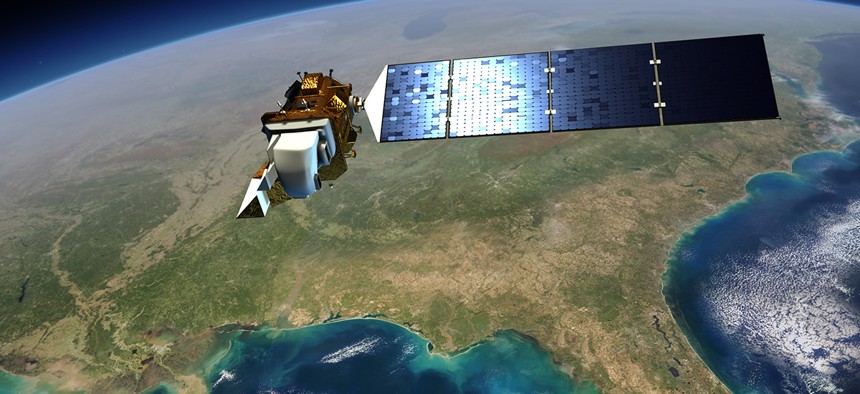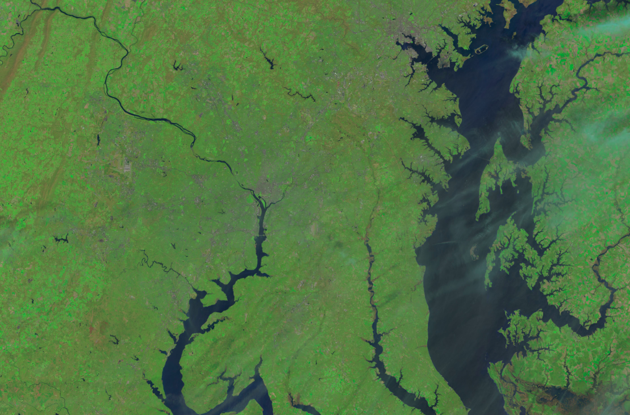
An artist's depiction of Landsat 8, which launched in 2013. NASA
A New Satellite for One of the Great Space Programs
Landsat 9 will launch in 2023, and promises the continuity of a critical, long-running database for imagery of the Earth's surface.
One of the U.S. government’s most useful science programs is also one of its least known.
The Landsat program doesn’t produce images like the ones of astronauts playing golf on the moon nor geologists scaling an erupting volcano, but it has created one of the most important scientific repositories of data ever made. Since 1972, one of the eight satellites in the Landsat program have photographed the entire Earth every 16 days. That means every place you’ve ever lived, worked, camped, run, swam, or looked at the stars—a picture of that place has been taken from orbit, more than 20 times per year, for more than four decades. You can even download those pictures from the web.
To which you may say, well , yes, of course there have been regular satellite pictures taken of the Earth. If that sounds like an unremarkable idea, it’s only because—just as you might read Shakespeare and find it full of clichés—the assumptions of the Landsat program have so soaked into society that we hardly notice them.
Chief among these assumptions is the idea that Landsat data is and therefore will always be continuous . Landsat forms one internally coherent set of data that goes back four decades. This is part of what makes it so useful.
And, on Thursday, it was announced that this continuity will be protected. NASA and the U.S. Geological Survey (USGS) have begun work on a new satellite in the program, to be called Landsat 9. The new satellite is scheduled to launch in 2023. With the new satellite, the Landsat database will include more than 50 years of imagery.

NASA and the USGS will also launch a small, cheaper satellite in 2019 that will track just infrared light in the bands that Landsat monitors. Infrared light is important because it can reveal vegetation patterns, crucial for ecologists and farmers.
Steve Cole, a NASA spokesman, told me this smaller satellite is “to prevent a possible gap in that kind of data.” By the scheduled launch of Landsat 9, the two older Landsat satellites that are still in operation—Landsat 8 and Landsat 7—will be 10 and 24 years old, respectively.
The announcement also hinted that the two agencies will begin examining if and how smaller satellites can do the work of Landsat. A number of startups, including California-based Planet Labs, are using small Cubesats to capture Earth imagery at similar resolutions to Landsat. The agencies also announced that, in President Obama’s new budget proposal, funding for Landsat will remain a priority. Up to this point, funding for the satellites had come on a satellite-by-satellite basis.
“We have recognized for the first time that we’re not just going to do one more, then stop, but that Landsat is actually a long-term monitoring activity, like the weather satellites, that should go on in perpetuity,” said Jeffrey Masek, a Landsat scientist at NASA’s Goddard Space Flight Center in Maryland, in a release .
Landsat has been producing Big Data since before data was big, and the new program will help it sustain its Big-ness. And while its data has been important for science—it has helped tracked the deforestation of the Amazon—it has also been crucial for American industry. Farmers and ranchers use Landsat to track irrigation patterns. Apple and Google draw on its huge reserves for their free maps, as do even more exciting mapping experiments . It’s even used by insurance companies. They all prize it for its continuity: the fact that it’s one data set that spans four decades.
“That’s the hallmark of Landsat: The longer the satellites view the Earth, the more phenomena you can observe and understand,” Masek said .
Something to watch in Landsat 9 is how and whether the basic technology of the satellites will change. Landsat’s pictures are “medium-resolution,” 30 meters per pixel, which means they show major city streets but not individual buildings. The government has been loathe to interfere with the private companies that collect and capture much higher-resolution imagery—the kind needed to see elephants or whales from space—but it has been deregulating their business, letting them sell much higher resolution imagery to the public than it has before. As it opens the very high-resolution business, it may feel comfortable increasing the resolution of its own free offerings.
Last year, the White House placed Landsat among two other, more famous programs—GPS and weather satellites—and said they were the most critical types of satellite programs for civilian life. Landsat is probably the least known of these, but I find the trifecta strangely moving. Using technology flung up above Earth, we can always assume that we’ll know where we are, what it looks like, and what the weather there will be.







